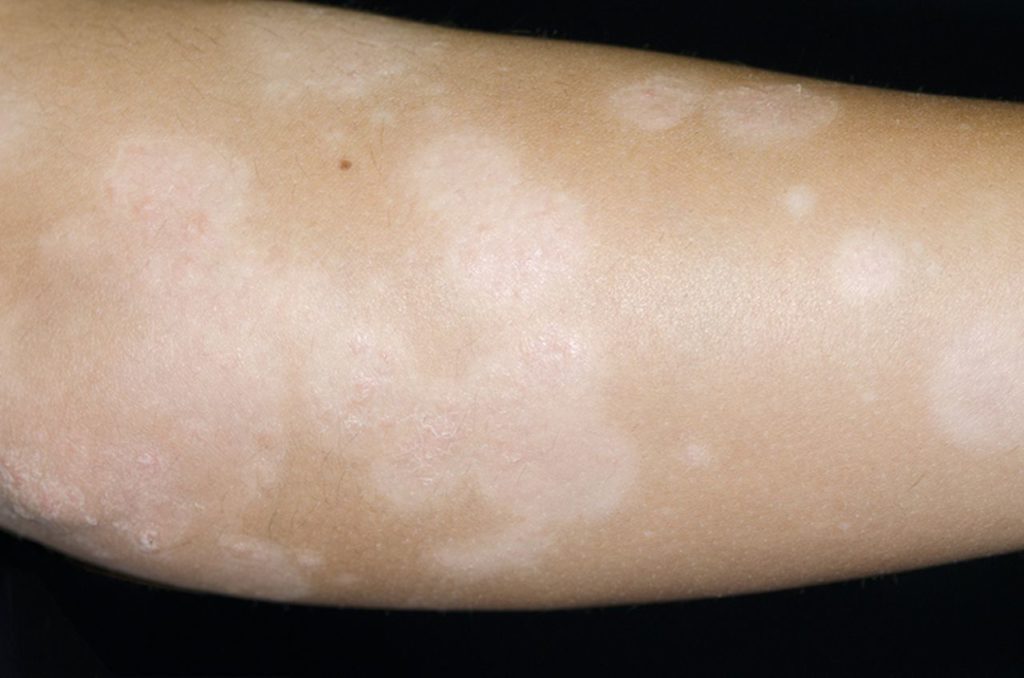HYPOPIGMENTATION

Definition: Hypopigmentation is the loss of skin color. It is caused by melanocyte or melanin depletion, or a decrease in the amino acid tyrosine (used by melanocytes to make melanin). [1]
Causes and Diseases associated with Hypopigmentation
Vitiligo: Vitiligo causes smooth, white patches on the skin and can appear all over the body. [2] It is an autoimmune disorder in which the pigment-producing cells (melanin) are damaged. There is no cure for vitiligo, but there are several treatments. The easiest is cosmetic cover-ups but there are also corticosteroid creams or laser treatments.
Albinism: Albinism is an inherited, genetic disorder caused by the absence of an enzyme that produces melanin. [2] This results in a complete lack of pigmentation in all skin, hair, or eyes. There is no cure for albinism, and it is most common in Caucasians. People with albinism should use a sunscreen at all times because they are much more likely to get sun damage and skin cancer.
Pigmentation loss as a result of skin damage: After a skin infection, blisters, burns or other trauma to your skin, there may be a loss of pigmentation in the affected area. The good news with this type of pigment loss is that it’s frequently not permanent, but it may take a long time to repigment. Cosmetics can be used to cover the area while the body regenerates the pigment. [2]
Improperly administered skin resurfacing treatments: Many skin resurfacing treatments such as Photofacials (IPL), laser peels, or chemical peels, can cause skin damage that results in hypopigmentation. Experienced physicians can avoid this side-effect. To successfully improve your skin and get results you are happy with depends in great measure on the skill and ability of the practitioner. The rule with skin rejuvenation is truly “you get what you pay for”. If something sounds too good to be true, it usually is. [3]
Treatment for Hypopigmentation
Treating post-inflammatory hypopigmentation may involve the use of topical corticosteroids, other topical lightening creams, light or laser treatment, or surgical skin grafting in severe cases.
Although the numerous lasers and other light-based treatments available today the IPL, excimer lasers, and the Fraxel Restore laser are the common light-based procedures that have been suggested for hypopigmentation treatment. [4]
If a chronic skin disorder is causing hypopigmentation, then treatment will likely involve topical prescription medications. For hypopigmentation that is unresponsive to medications permanent makeup may be the best option. [4]
Topical medications, such as hydroquinone, TriLuma, and other skin lightening agents, may be used to bleach skin not affected by hypopigmentation so that it can blend in better with hypopigmented skin. [4]
Preventing hypopigmentation
The causes of hypopigmentation are difficult to avoid, because the onset of a chronic skin disease that occurs as a result of heredity or other unknown causes. However, a few simple precautions can help prevent hypopigmentation. These include:
- Take care of your skin – Have a skin-care routine and properly cleanse, exfoliate, moisturize and generally care for your skin.
- Help healing skin – After your skin has been damaged and begun the natural healing process, it is more susceptible to developing hypopigmentation. [4] Protect healing skin from the sun, don’t pick scabs, and use antibiotic ointment (like Neosporin) to promote the skin’s natural repair process.
- Treat Acne – Acne can cause scars and pigmentation problems if left unchecked.
- Choose a doctor wisely – The skin is delicate, and improperly administered skin treatments involving lasers, chemicals, or other forms of ablation (removal of the outer layers of skin), can have devastating results. Make sure you trust your doctor, check out their credentials, certification, and before and after photos, and discuss all potential risks before undergoing skin treatment. [4]
Questions to Ask your Doctor
The following are some suggested questions you can ask your doctor to learn more about treatment and the practice:
About your Doctor:
- How many years have you been doing skin rejuvenation?
- What variety of treatment options do you offer?
- Do you own your lasers?
- Do you have before-and-after photographs of treatments you’ve performed?
- Do you have any patient testimonials?
- What are you board-certified in? [3]
About your procedure:
- How many treatments will be necessary to see significant results?
- What can I expect in terms of results?
- Does my skin present any special risks or concerns?
- How much will the treatments cost? [3]


